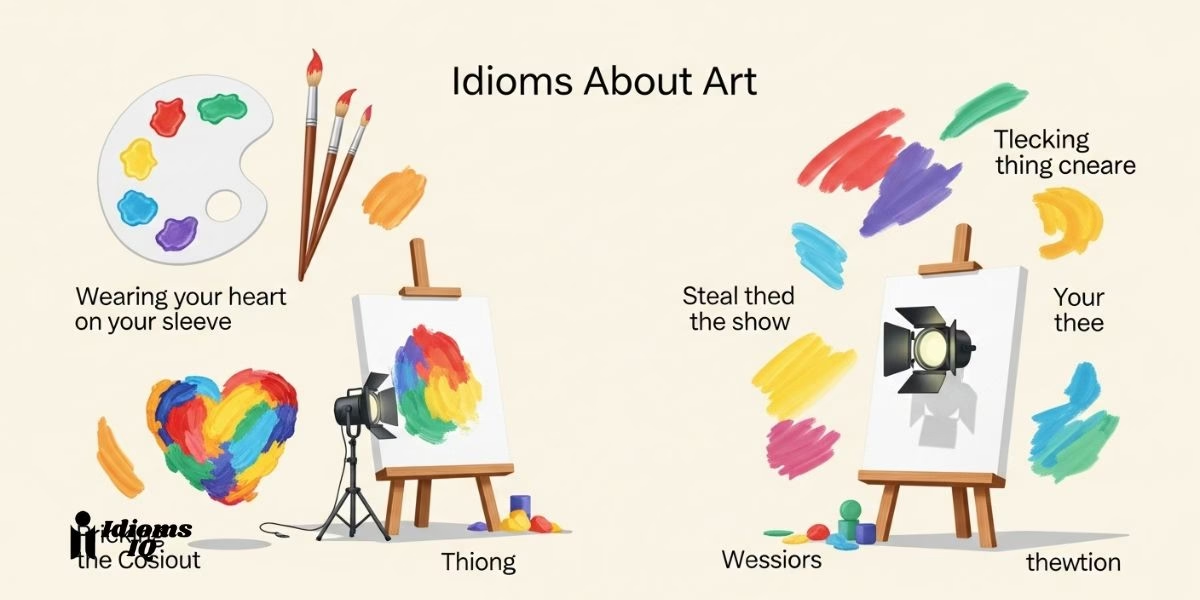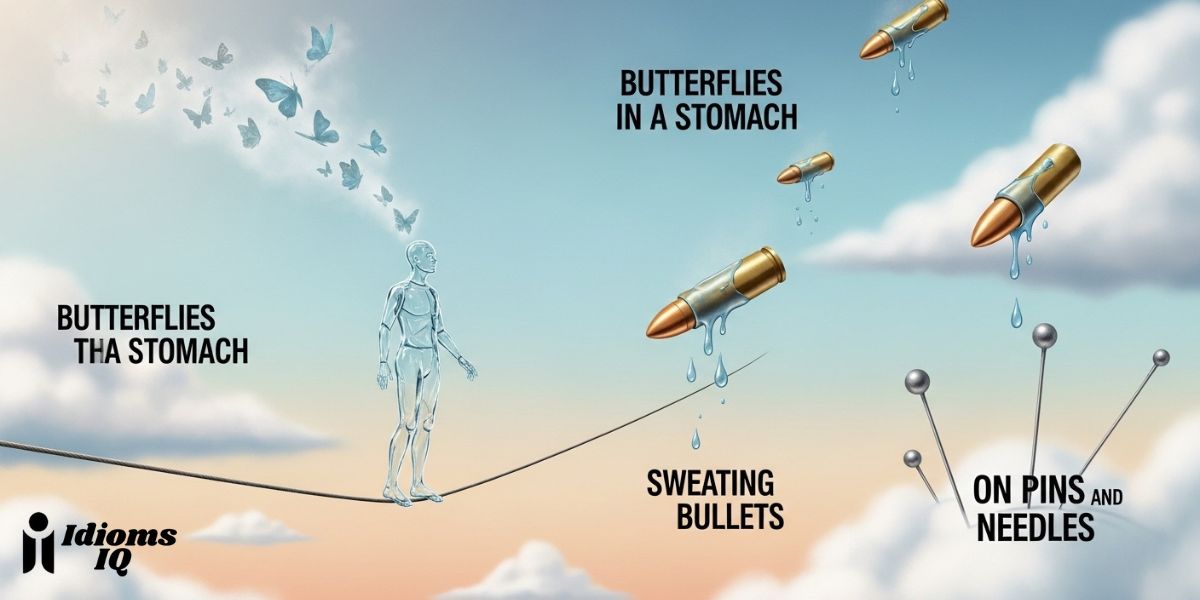
Idioms are the colorful currents that flow through the ocean of language, turning simple statements into deep reservoirs of meaning. They are phrases where the combined words create a new, figurative sense, acting as a kind of cultural shorthand that connects us through shared experience. Think of them as small, polished stones of wisdom, shaped by the constant flow of human interaction.
By exploring idioms, we don’t just learn new vocabulary; we gain a more profound understanding of life itself. These expressions can articulate complex emotions with beautiful precision, bring clarity to confusing situations, and offer a fresh perspective on our own experiences, inspiring us to think more deeply.
Something “cool” is often just a step away from being totally impressive. If you’re describing moments that go beyond cool, these idioms for amazing will help you capture the full wow factor.
Idioms About Water
1. Water under the bridge
- Meaning: Past events that are no longer important and have been forgiven or forgotten.
- Use in a sentence: “We had our disagreements years ago, but that’s all water under the bridge now.”
- Other ways to say it: Let bygones be bygones, what’s done is done, no use crying over spilt milk.
2. In hot water
- Meaning: To be in trouble or a difficult situation where you are likely to be punished.
- Use in a sentence: “He’s in hot water with the teacher for not doing his homework.”
- Other ways to say it: In the doghouse, up a creek without a paddle, in deep trouble.
3. A fish out of water
- Meaning: A person who feels uncomfortable or out of place because they are in an unfamiliar environment.
- Use in a sentence: “As a country boy, he felt like a fish out of water in the bustling city.”
- Other ways to say it: A square peg in a round hole, does not fit in, out of one’s element.
4. To keep your head above water
- Meaning: To manage to survive, especially financially, during a difficult period.
- Use in a sentence: “With the rising bills, we are barely keeping our heads above water.”
- Other ways to say it: To make ends meet, to get by, to scrape by.
5. Blood is thicker than water
- Meaning: Family relationships and loyalties are the strongest and most important ones.
- Use in a sentence: “I’ll always help my brother; after all, blood is thicker than water.”
- Other ways to say it: Family comes first, charity begins at home.
6. Come hell or high water
- Meaning: No matter what difficulties or obstacles may arise.
- Use in a sentence: “I will be at your wedding, come hell or high water.”
- Other ways to say it: Whatever it takes, no matter what, by any means necessary.
7. To test the waters
- Meaning: To try something new cautiously to see if it will be successful or accepted.
- Use in a sentence: “She decided to test the waters by launching a small collection before the main one.”
- Other ways to say it: To dip a toe in the water, to try it out, to gauge the reaction.
8. A drop in the ocean
- Meaning: A very small amount compared to what is needed or expected.
- Use in a sentence: “The money they raised was just a drop in the ocean compared to the total cost of the project.”
- Other ways to say it: A drop in the bucket, a pittance, barely scratches the surface.
9. To be dead in the water
- Meaning: A plan or project that has failed and has no hope of succeeding in the future.
- Use in a sentence: “Without new funding, the entire initiative is dead in the water.”
- Other ways to say it: Doomed to fail, a lost cause, has no future.
10. To pour oil on troubled water

- Meaning: To try to calm a difficult or angry situation.
- Use in a sentence: “His calm speech helped to pour oil on troubled waters after the heated argument.”
- Other ways to say it: To be a peacemaker, to smooth things over, to defuse the situation.
11. Doesn’t hold water
- Meaning: An argument, explanation, or theory that is not logical, believable, or sound.
- Use in a sentence: “His excuse for being late doesn’t hold water; I know he just overslept.”
- Other ways to say it: It doesn’t add up, it’s full of holes, that’s a weak argument.
12. To be at sea
- Meaning: To be confused or unsure about what to do.
- Use in a sentence: “When it comes to advanced physics, I’m completely at sea.”
- Other ways to say it: To be all mixed up, to be lost, to not have a clue.
13. Plenty of fish in the sea
- Meaning: There are many other potential partners available after a relationship ends.
- Use in a sentence: “Don’t be sad about the breakup; there are plenty of fish in the sea.”
- Other ways to say it: There are other options, it’s not the end of the world.
14. To make waves
- Meaning: To cause trouble or disturb a situation by changing things or introducing new ideas.
- Use in a sentence: “She likes to make waves in the company with her innovative but controversial proposals.”
- Other ways to say it: To stir the pot, to rock the boat, to cause a stir.
15. To be in deep water
- Meaning: A more serious version of being “in hot water”; to be in a very difficult or dangerous situation.
- Use in a sentence: “After he was caught lying to the authorities, he knew he was in deep water.”
- Other ways to say it: In serious trouble, up to one’s neck in it.
16. To take to something like a duck to water
- Meaning: To learn how to do something new very easily and naturally.
- Use in a sentence: “She took to playing the piano like a duck to water.”
- Other ways to say it: To be a natural, to have a knack for it, to learn it in no time.
17. To throw someone in at the deep end
- Meaning: To put someone in a new and difficult situation without any preparation or help.
- Use in a sentence: “On my first day, they threw me in at the deep end by asking me to lead the client meeting.”
- Other ways to say it: Trial by fire, sink or swim.
18. A sea change
- Meaning: A profound or complete transformation.
- Use in a sentence: “The internet has brought about a sea change in the way we communicate.”
- Other ways to say it: A complete turnaround, a radical transformation, a paradigm shift.
19. Between the devil and the deep blue sea
- Meaning: To be in a difficult situation where you have to choose between two equally unpleasant options.
- Use in a sentence: “He was caught between the devil and the deep blue sea: either tell his friend the truth and hurt him, or lie and feel guilty.”
- Other ways to say it: Caught between a rock and a hard place, on the horns of a dilemma.
20. Still waters run deep

- Meaning: A person who is quiet or shy on the surface may have a passionate, intelligent, or complex personality underneath.
- Use in a sentence: “He rarely speaks, but still waters run deep; he’s one of the most brilliant people I know.”
- Other ways to say it: Don’t judge a book by its cover, there’s more to him than meets the eye.
21. To be a wet blanket
- Meaning: A person who spoils other people’s fun by being negative and complaining.
- Use in a sentence: “Don’t be such a wet blanket, come and join the party!”
- Other ways to say it: A killjoy, a party pooper, a stick-in-the-mud.
22. You can lead a horse to water, but you can’t make it drink
- Meaning: You can give someone an opportunity, but you can’t force them to take it.
- Use in a sentence: “I gave him all the resources to study, but you can lead a horse to water, but you can’t make it drink.”
- Other ways to say it: You can only do so much, the rest is up to them.
23. To muddy the waters
- Meaning: To make a situation more confusing or complicated than it was before.
- Use in a sentence: “Bringing up old arguments now will only muddy the waters.”
- Other ways to say it: To complicate the issue, to create confusion.
24. To swim against the tide
- Meaning: To go against the prevailing opinion or trend.
- Use in a sentence: “She was swimming against the tide by advocating for a policy everyone else opposed.”
- Other ways to say it: To go against the grain, to be a lone voice.
25. To be out of your depth
- Meaning: To be in a situation that is too difficult for you to handle.
- Use in a sentence: “I felt completely out of my depth in the advanced calculus class.”
- Other ways to say it: In over one’s head, not up to the task.
26. The coast is clear
- Meaning: There is no danger of being seen or caught.
- Use in a sentence: “Wait for my signal. I’ll let you know when the coast is clear.”
- Other ways to say it: No one is watching, it’s safe to proceed.
27. To be on thin ice
- Meaning: To be in a risky or precarious situation where you could easily get into trouble.
- Use in a sentence: “After being late three times this week, you’re on thin ice with the boss.”
- Other ways to say it: On shaky ground, asking for trouble.
28. Tip of the iceberg
- Meaning: Only a small, visible part of a much larger problem or situation.
- Use in a sentence: “The reported cases are just the tip of the iceberg; many more go unreported.”
- Other ways to say it: Just the beginning, only scratching the surface.
29. To go with the flow
- Meaning: To be relaxed and accept a situation rather than trying to control it.
- Use in a sentence: “Instead of making a strict plan, let’s just go with the flow and see where the day takes us.”
- Other ways to say it: To take things as they come, to play it by ear.
30. To be plain sailing

- Meaning: To be easy and without problems.
- Use in a sentence: “Once we got the funding, the rest of the project was plain sailing.”
- Other ways to say it: A walk in the park, a piece of cake, smooth sailing.
31. To tread water
- Meaning: To make an effort but no real progress; to stay in the same position without advancing or falling behind.
- Use in a sentence: “The company has been treading water for years, neither growing nor failing.”
- Other ways to say it: To be at a standstill, to be in a holding pattern.
32. To be all wet
- Meaning: To be completely wrong or mistaken.
- Use in a sentence: “If you think you can finish this project in an hour, you’re all wet.”
- Other ways to say it: To be way off base, to be completely mistaken.
33. To throw cold water on something
- Meaning: To be negative or discouraging about someone’s idea or plan.
- Use in a sentence: “I was excited about my new business idea, but my dad threw cold water on it.”
- Other ways to say it: To be a naysayer, to pour scorn on, to dismiss an idea.
34. To be like oil and water
- Meaning: Two people who do not and cannot get along or mix well together.
- Use in a sentence: “My two brothers are like oil and water; they argue constantly.”
- Other ways to say it: Like cats and dogs, they don’t see eye to eye.
35. To sail close to the wind
- Meaning: To do something that is dangerous or on the verge of being illegal or improper.
- Use in a sentence: “His business practices are sailing close to the wind, and he might get investigated.”
- Other ways to say it: To push the envelope, to take a risk.
36. To make a splash
- Meaning: To attract a lot of attention in a successful and exciting way.
- Use in a sentence: “Her debut novel made a huge splash and quickly became a bestseller.”
- Other ways to say it: To cause a sensation, to be a great success.
37. To be a drip
- Meaning: To be a boring, weak, or uninteresting person.
- Use in a sentence: “I don’t want to invite him; he can be a bit of a drip.”
- Other ways to say it: A dull person, a bore.
38. To be high and dry
- Meaning: To be left in a difficult situation without any help or resources.
- Use in a sentence: “When the company closed, the employees were left high and dry.”
- Other ways to say it: Left in the lurch, stranded.
39. To be in uncharted waters
- Meaning: To be in a new and unfamiliar situation.
- Use in a sentence: “With this new technology, we are in uncharted waters.”
- Other ways to say it: In unknown territory, breaking new ground.
40. The world is your oyster

- Meaning: You have the freedom and ability to do whatever you want and go wherever you want.
- Use in a sentence: “After you graduate, the world is your oyster.”
- Other ways to say it: The sky’s the limit, you have endless opportunities.
Fill-in-the-Blank Exercise
- I was so nervous giving that speech; I felt like a ________________.
- Don’t worry about that old argument; it’s all ________________ now.
- He’s ________________ with his parents for breaking the vase.
- She tried to ________________ by launching a small survey before committing to the big project.
- The charity donation, while welcome, was just a ________________ compared to what was needed.
- His excuse for being late simply ________________.
- After losing the map, we were completely ________________.
- His quiet demeanor is misleading; ________________.
- Stop trying to ________________ by bringing up irrelevant details.
- I feel completely ________________ in this advanced negotiation class.
- The financial problems we know about are just the ________________.
- Once the main issue was resolved, the rest of the project was ________________.
- I’m trying to save money, but I feel like I’m just ________________ without making progress.
- I was excited about my plan, but he ________________ it immediately.
- When their car broke down in the desert, they were left ________________.
Answer Key
- fish out of water
- water under the bridge
- in hot water
- test the waters
- drop in the ocean
- doesn’t hold water
- at sea
- still waters run deep
- muddy the waters
- out of my depth
- tip of the iceberg
- plain sailing
- treading water
- threw cold water on
- high and dry
Conclusion
Embracing idioms is like learning to navigate by the stars; it adds depth and direction to our communication. These phrases are more than just linguistic quirks; they are vessels carrying cultural wisdom and shared human understanding. By consciously incorporating idioms into our vocabulary, we not only make our writing and speech more colorful and engaging but also enhance our emotional intelligence.
This practice helps us to better articulate our own complex feelings and to grasp the subtle, unspoken nuances in others’ words. Ultimately, idioms are powerful tools that allow us to navigate the vast ocean of human experience with greater clarity, creativity, and connection.






